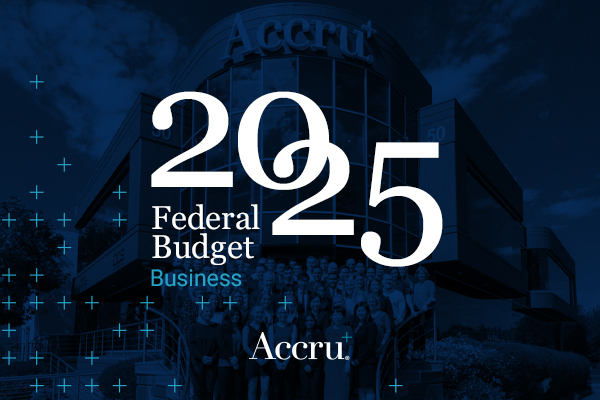Much like last year, a number of measures will present business opportunities in existing (housing and infrastructure) and emerging sectors (green and renewable transitions), however there are very few short term taxation changes. There is continued focus and funding on compliance and anti-avoidance programs as a mechanism to support the Budget. Furthermore, other initiatives regarding tertiary education and apprenticeships in particular, whilst not directly tax related, could have a direct or indirect impact on business operations.

Another economic reform that impacts business outside of taxation is the reform of non-compete clauses, with an intention to outlaw and remove non-compete clauses for employees earning less than $175,000 annually (the high income threshold under the Fair Work Act). This initiative has arisen out of the Government’s Competition Review.
Future Made in Australia
Although there are not really any new tax initiatives for SME businesses, the Future Made in Australia policy, remains a key pillar of the Government’s future vision of Australia and its place as an “indispensable part” of the transition to green and renewable energy on the path to Net Zero.
Since MYEFO (December 2024), the Government has progressed a broad range of initiatives aligned with the Future Made in Australia agenda. This includes the passage of legislation supporting the hydrogen and critical minerals production tax incentives and committing an additional $2 billion to the Clean Energy Finance Corporation to continue mobilising critical private investment into renewable energy, energy efficiency and low emissions technologies.
The Government has also announced priority sector funding allocations from the $1.7 billion Future Made in Australia Innovation Fund. This includes $750 million for green metals, $500 million for clean energy technology manufacturing capabilities including electrolysers, batteries and wind towers and $250 million for low carbon liquid fuels.
Small Business $20,000 Instant Asset Write-off extended to 30 June 2025
For the first time in many years there was no mention of the Small Business Instant Asset Write-off. In its current form, for small businesses with aggregated turnover under $10 million, there is a proposal to retain the instant asset write-off threshold at $20,000 for assets installed ready for use from until 30 June 2025. That proposal is not yet legislation, so technically for the current year the write-off threshold is set at $1,000, with an expectation it will be increased to $20,000 before 30 June 2025. After that it would once again revert to $1,000.
The $20,000 threshold will apply on a per asset basis, so small businesses can instantly write off multiple assets. Assets valued at $20,000 or more (which cannot be immediately deducted) can continue to be placed into the small business simplified depreciation pool and depreciated at 15 per cent in the first income year and 30 per cent each income year thereafter. The provisions that prevent small businesses from re-entering the simplified depreciation regime for 5 years if they opt-out will continue to be suspended until 30 June 2025.
Alcohol Production
The Government has announced two measures directed to supporting the hospitality sector and alcohol producers:
- The Government will pause indexation on draught beer excise and excise equivalent customs duty rates for a two‑year period, from August 2025. Under this measure biannual indexation of draught beer excise and excise equivalent customs duty rates due to occur in August 2025, February 2026, August 2026, and February 2027 will not occur. Biannual indexation will then recommence from August 2027.
- The Government will also increase support available under the existing Excise remission scheme for manufacturers of alcoholic beverages (the Remission scheme) and Wine Equalisation Tax (WET) producer rebate (Producer rebate). Currently, all eligible brewers and distillers can receive an excise remission under the Remission Scheme up to a cap of $350,000. All eligible wine producers can currently receive a WET rebate up to a cap of $350,000 under the Producer rebate. This measure will increase the caps for all eligible brewers, distillers and wine producers to $400,000 per financial year, from 1 July 2026.
ATO funding and compliance programs
Tax compliance activity remains one of the Government’s initiatives in dealing with the structural deficit in the Federal Budget. A number of compliance programs will continue to receive funding, or receive additional funding to the tune of $999 million over four years:
- $717.8 million over four years from 1 July 2025 for a two-year expansion and a one-year extension of the Tax Avoidance Taskforce. This supports the ATO’s continued tax compliance scrutiny on multinationals and other large taxpayers.
- $155.5 million over four years from 1 July 2025 to extend and expand the Shadow Economy Compliance Program to reduce shadow economy behaviour such as worker exploitation, under‑reporting of taxable income, illicit tobacco and other shadow economy activity that enables non‑compliant businesses to undercut competition.
- $75.7 million over four years from 1 July 2025 to extend and expand the Personal Income Tax Compliance Program. This will enable the ATO to continue to deliver a combination of proactive, preventative and corrective activities in key areas of non-compliance.
- $50 million over three years from 1 July 2026 to extend the Tax Integrity Program. This will enable the ATO to continue its engagement program to ensure timely payment of tax and superannuation liabilities by medium and large businesses and wealthy groups.
This measure (which includes the Personal Income Tax Compliance program under Personal Taxation) is estimated to increase receipts by $3.2 billion over five years from 2024–25, and increase payments by $1.4 billion, including an increase in GST payments to the states and territories of $402.6 million and $31 million in unpaid superannuation to be disbursed to employees.
In addition to the ATO funding, the Government also announced additional funding for the Tax Practitioners Board to assist with compliance and disciplinary action, together with making re-registration after career breaks easier. The Government will strengthen the sanctions available to the Tax Practitioners Board (TPB), modernise the registration framework for tax practitioners and provide funding to the TPB to undertake additional compliance targeting high-risk tax practitioners over four years from 1 July 2025. This measure will protect taxpayers from tax agent misconduct, including poor and unlawful tax advice, and maintain community confidence in the integrity of the tax system.
Foreign resident capital gains tax (CGT) notification and withholding
The Government’s changes to expand and strengthen the foreign resident capital gains tax (CGT) regime announced last year has a deferred start date of 1 October 2025 or the first 1 January, 1 April, 1 July or 1 October after the Act receives Royal Assent. As a reminder, the amendments will apply to CGT events to:
- clarify and broaden the types of assets that foreign residents are subject to CGT on
- amend the point-in-time principal asset test to a 365-day testing period
- require foreign residents disposing of shares and other membership interests exceeding $20 million in value to notify the ATO, prior to the transaction being executed.
This measure will ensure that Australia can tax foreign residents on direct and indirect sales of assets with a close economic connection to Australian land, more in line with the tax treatment that already applies to Australian residents. The new ATO notification process will improve oversight and compliance with the foreign resident CGT withholding rules, where a vendor self-assesses their sale is not taxable real property. The Government will consult on the implementation details of the measure.
For more information on the March 2025 Federal Budget please click here for our overview.
